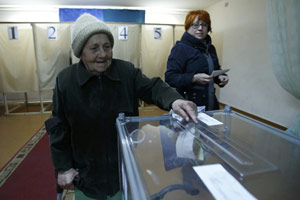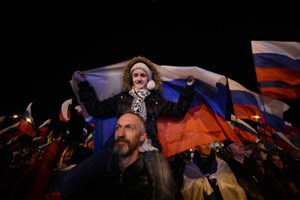European Union foreign ministers moved on Monday toward imposing more sanctions on Russian and Crimean officials linked to the secession of the peninsula. These include asset freezes and travel bans.
British Foreign Secretary William Hague hinted that more measures against Russia could be taken at a summit of EU leaders starting on Thursday.
The EU has already suspended talks with Russia on a wide-ranging economic pact and a visa agreement, and EU leaders could start slapping economic sanctions on Russia over the weekend.
The ministers are also expected to cancel an EU-Russia summit, scheduled for June in Sochi, Russia.
At the same time, ministers have hinted that they want to prevent any punitive measures from being too drastic.
German Foreign Minister Frank-Walter Steinmeier said any measures must leave "ways and possibilities open to prevent a further escalation that could lead to the division of Europe".
The US is also preparing to identify Russians to punish with visa bans and asset freezes, authorized by President Barack Obama this month.
The White House said in a statement that Obama told Russian President Vladimir Putin on Sunday that the US and its allies in Europe would impose sanctions against Russia should it annex Crimea.
However, the Associated Press said on Monday, "The Obama administration slightly shifted its focus to keeping Russia from encroachment into Ukraine beyond Crimea, where it has a large naval base."
Yang Cheng, deputy director of the Center for Russian Studies at East China Normal University in Shanghai, said that in past decades Moscow's policy priority regarding the Ukraine situation has been to put Ukraine under its defense umbrella on the precondition that the territorial integrity of Ukraine is guaranteed.
"As long as Ukraine is trying to drift away from Russia and goes closer to the West, Moscow would step up pressure and ask Ukraine to ensure Russia's interests," Yang said.
The best option for the West is to prevent the turbulence in Ukraine from running out of control, Yang said.
Qu Xing, from the China Institute of International Studies, said the raised stakes between the West and Moscow in the region have left Ukraine no room to move and makes it more unlikely that a solution will be found that pleases both sides.
Contact the writers at lixiaokun@chinadaily.com.cn and zhangyunbi@chinadaily.com.cn
Reuters and AP contributed to this story.
 |
 |
| Crimea holds referendum on future | Crimeans celebrate vote to join Russia |